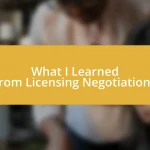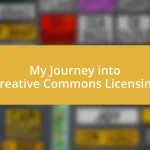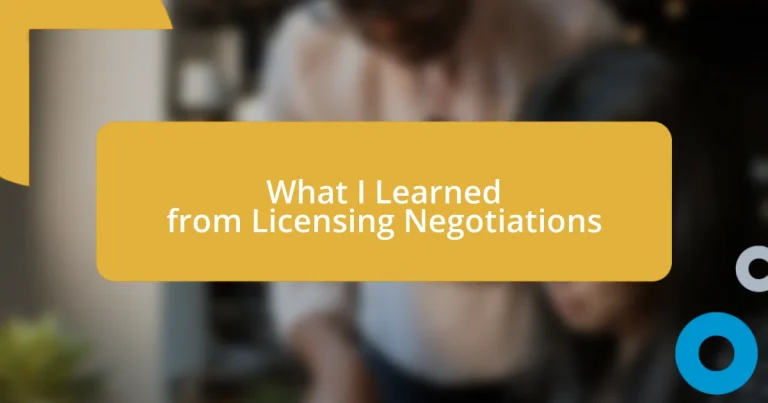Key takeaways:
- Understanding licensing as a strategic partnership emphasizes the importance of trust, flexibility, and recognizing the needs of both licensors and licensees.
- Effective negotiation preparation includes thorough research, clearly defined goals, and role-playing to build confidence and anticipate challenges.
- Clear communication, emotional intelligence, and the involvement of legal expertise are crucial for navigating complex negotiations and achieving mutually beneficial outcomes.
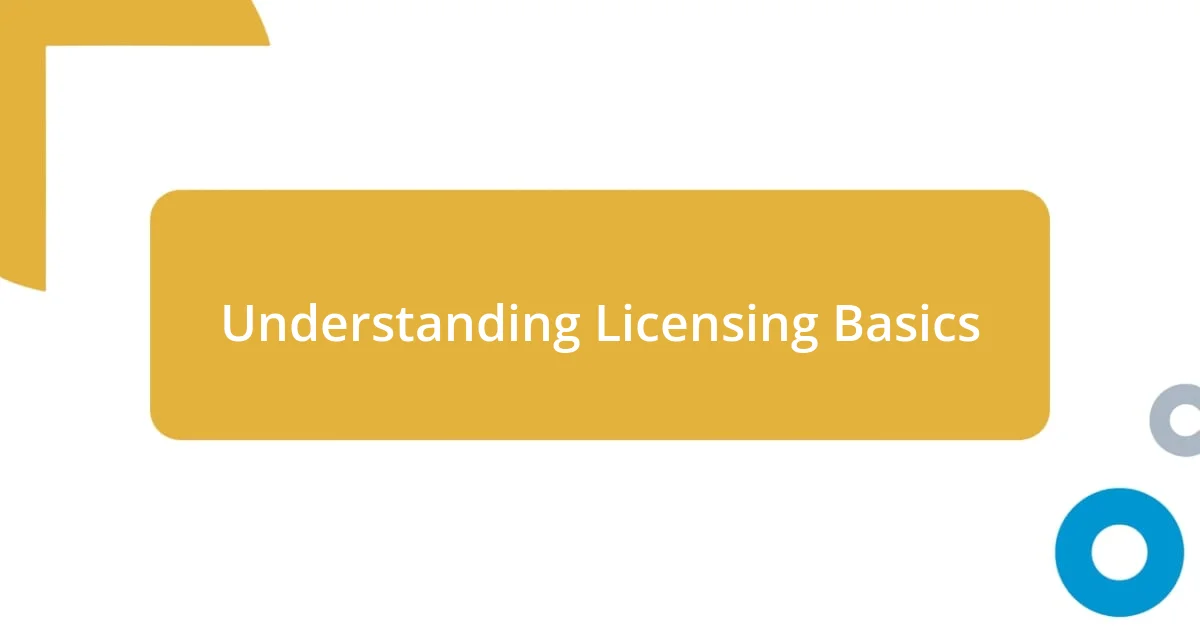
Understanding Licensing Basics
Licensing is much more than just a legal formality; it’s a strategic partnership that defines how intellectual property (IP) is shared and monetized. I remember when I first encountered a licensing agreement, feeling overwhelmed by all the jargon. It’s intriguing how a few pages of a contract can determine the fate of an innovative idea.
At the core of licensing is the concept of granting permission. Think about it—when you license your work, you’re essentially saying, “I trust you to represent my ideas.” This trust wasn’t easy for me to extend. In my early experiences, I found myself questioning whether others would honor my vision or alter it beyond recognition. My emotions were a mix of excitement and trepidation, reflecting the delicate balance of control and collaboration.
Understanding the different types of licenses is crucial. For instance, exclusive licenses grant one party sole rights to use the IP, while non-exclusive ones allow multiple parties access. When I first negotiated my first non-exclusive license, it was eye-opening to see how valuable flexibility can be. It makes me wonder: how have others navigated this balancing act between exclusivity and reach in their negotiations?
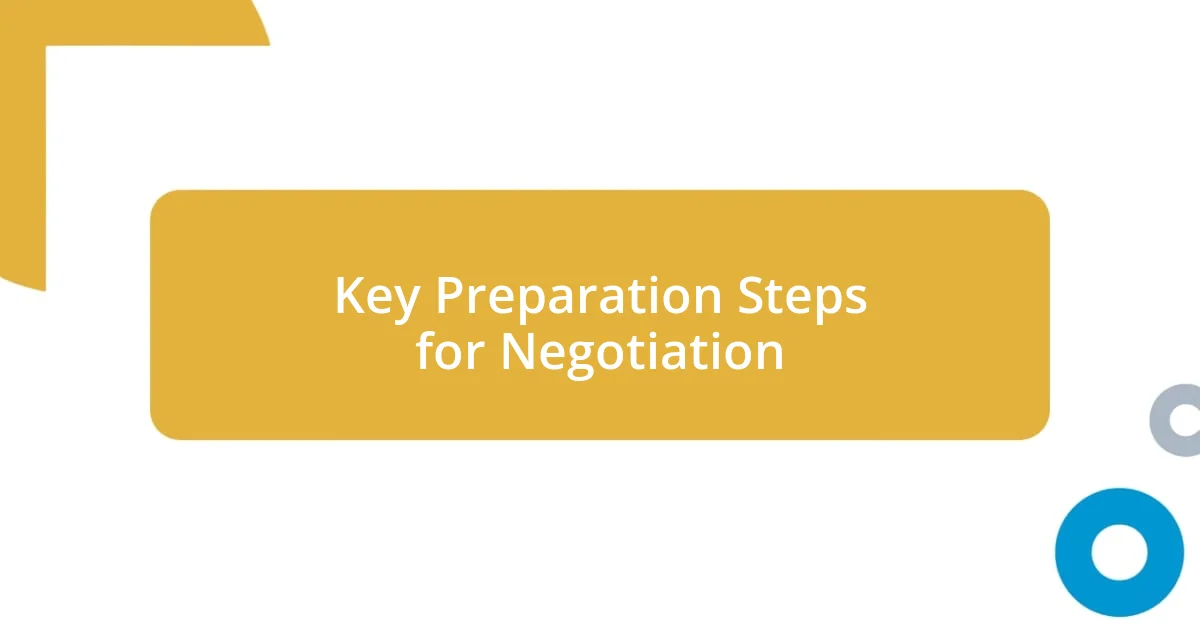
Key Preparation Steps for Negotiation
When preparing for a negotiation, the first step is thorough research. I’ve always found that diving deep into the other party’s background and motivations makes a significant difference. I remember a time when I was negotiating a licensing deal, and I stumbled upon some insightful data about the other company’s market strategies. It completely changed my approach, allowing me to position my proposal in a way that resonated with their objectives.
Next, crafting a clear list of your goals and acceptable compromises is essential. In one of my earlier negotiations, I neglected to outline my priorities clearly and ended up conceding points that didn’t serve my interests. It was a valuable lesson that reinforced the significance of knowing not just what I wanted, but also what I was willing to let go of to reach a satisfactory agreement.
Lastly, role-playing potential negotiation scenarios can be incredibly beneficial. I recall engaging in mock negotiations with a colleague, which helped me anticipate challenging questions and refine my responses. That experience not only boosted my confidence but also equipped me with a toolkit of strategies that I could pull from during the actual negotiation.
| Preparation Step | Description |
|---|---|
| Thorough Research | Understand the other party’s background, motivations, and market strategies to shape your proposal. |
| Identify Goals | Create a clear list of your objectives and acceptable compromises to stay focused during negotiations. |
| Role-Playing Scenarios | Engage in mock negotiations to practice responses and build confidence for real discussions. |
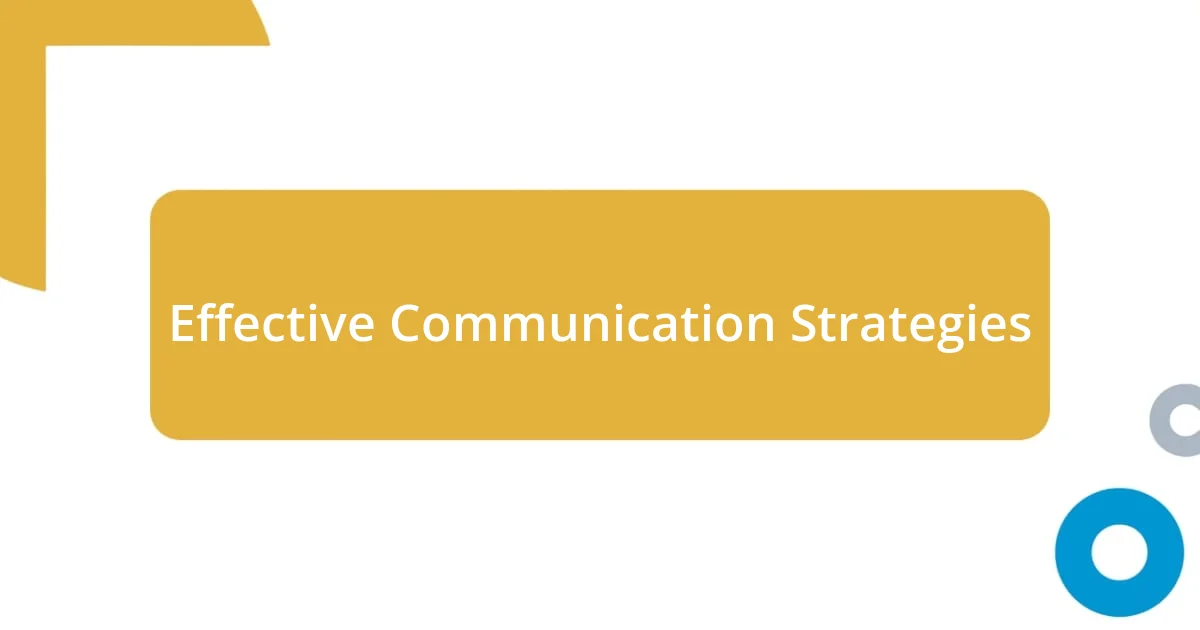
Effective Communication Strategies
When it comes to effective communication during licensing negotiations, I’ve discovered that clarity is a game-changer. In one of my negotiations, I learned firsthand how important it is to articulate my terms in straightforward language. Jargon can alienate the other party and lead to misunderstandings. I found that by keeping my message simple and direct, I received much better responses and fostered a more collaborative atmosphere.
To enhance your communication strategy, consider the following tips:
- Establish Ground Rules: Start discussions by agreeing on how you will communicate, which sets a positive tone.
- Active Listening: Make it a point to truly understand the other party’s perspective, which builds rapport and encourages openness.
- Ask Open-Ended Questions: These invite broader discussions and reveal important insights about the other party’s needs and motivations.
- Use Visual Aids: When discussing complex points, a simple diagram or chart can clarify your ideas, making them easier to grasp.
- Reflect Emotionally: Acknowledge the emotional aspects of negotiations; expressing empathy can build trust and ease tensions.
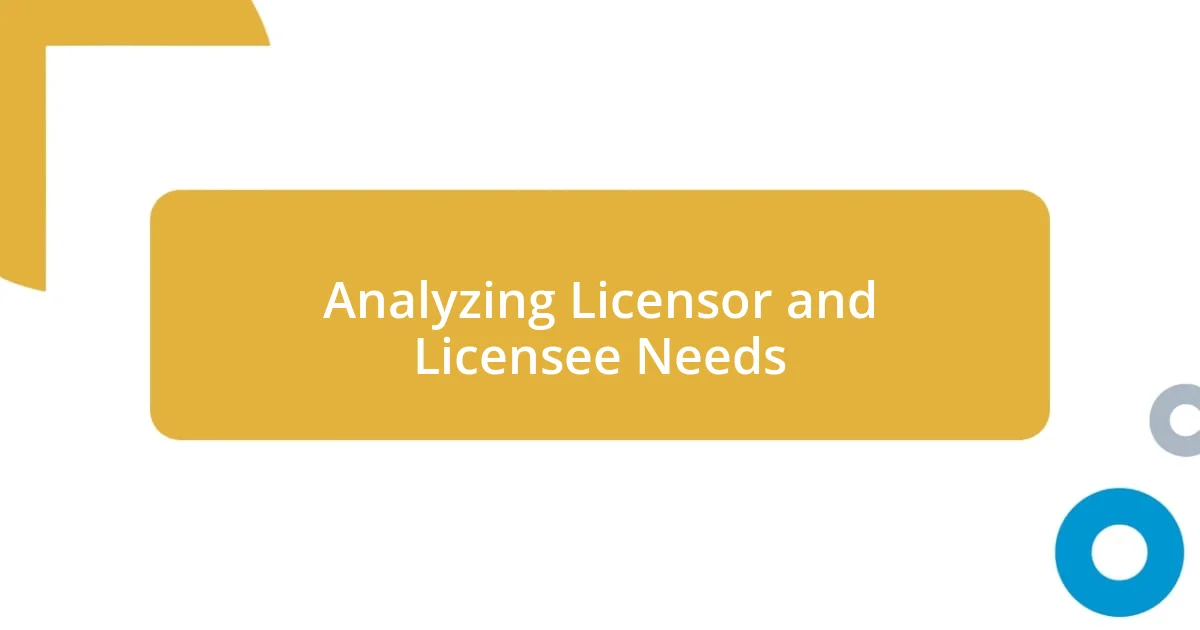
Analyzing Licensor and Licensee Needs
Understanding the needs of both licensors and licensees is crucial. I remember one negotiation where I spent time listening to the licensor’s long-term vision. It became clear that they were focused not only on immediate gains but also on fostering brand loyalty. Recognizing this shifted my focus from just financial terms to how my proposal could also support their overarching goals.
Evaluating the other party’s motivations often reveals underlying needs that aren’t initially obvious. I once faced a situation where the licensee was primarily concerned about market entry risks. By addressing this fear in our discussions, I could craft a solution that not only satisfied my interests but also alleviated their concerns. Isn’t it fascinating how understanding someone’s fears can lead to mutual benefits?
Ultimately, identifying and analyzing these needs enables you to find common ground. I’ve learned that asking questions like, “What specific outcomes are most valuable to you?” can unlock insights that transform a simple deal into a fruitful partnership. It’s a journey where both parties can emerge with not just a contract but a shared vision.
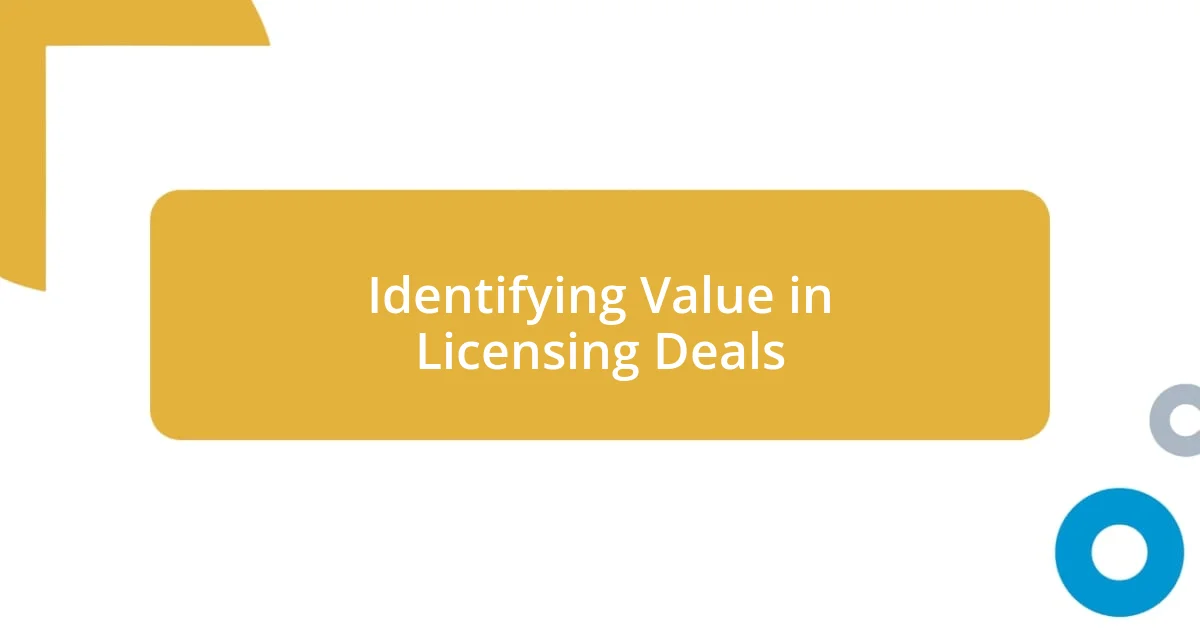
Identifying Value in Licensing Deals
Identifying value in licensing deals often involves more than just crunching numbers; it’s about understanding what truly matters to both parties. I recall a licensing negotiation where I underestimated the importance of brand compatibility. I initially focused solely on monetary terms, but once I acknowledged how both brands could enhance each other’s reputation, we discovered a value proposition that benefitted everyone involved. Isn’t it incredible how a shared vision can elevate a simple agreement into something transformative?
Another key to extracting value is recognizing the intangible benefits, such as market positioning and strategic synergy. During one negotiation, I learned that a long-term partnership could provide greater stability and trust than a quick payout. I asked myself, what is the long-term vision here? By investing in a relationship that aligned with both our strategic goals, we uncovered value that far exceeded our initial expectations. Isn’t that a worthwhile consideration?
Lastly, it’s essential to quantify both tangible and intangible assets effectively. I once had a situation where my licensee proposed a lower royalty rate, but they were also willing to provide extensive market insights that could save us tens of thousands in research costs. Realizing this made me rethink value — was it only about immediate revenue, or was it also about the broader benefits that could enhance overall success? The answer became clear: value is multi-faceted, encompassing both measurable outcomes and relationship growth.
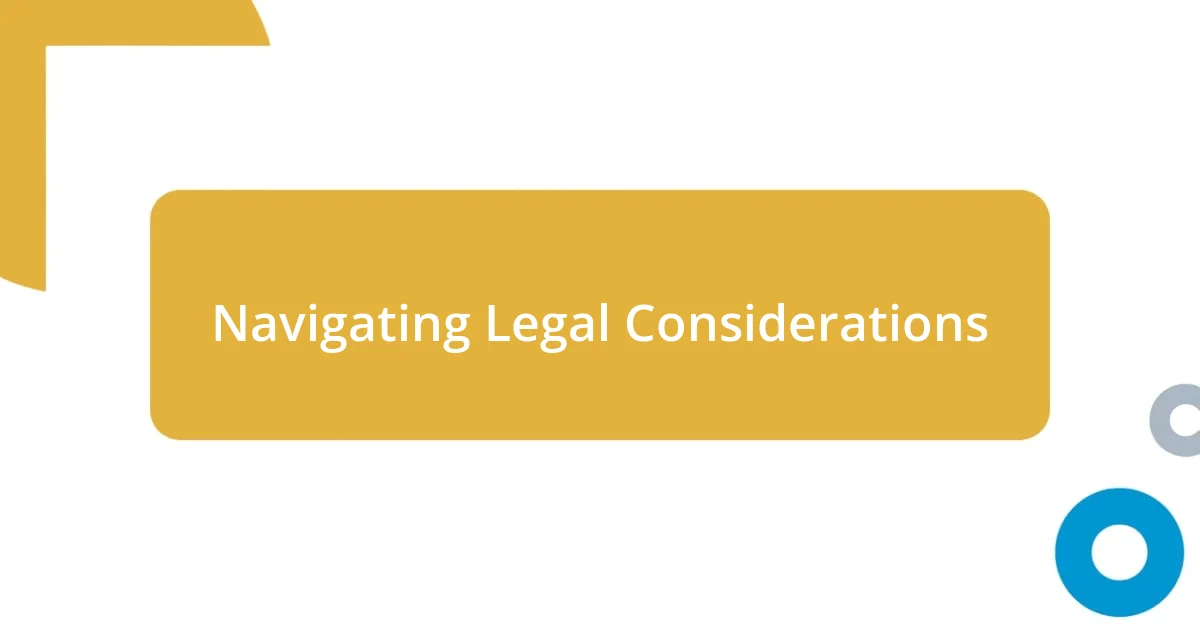
Navigating Legal Considerations
Navigating legal considerations in licensing negotiations can feel daunting. I remember a particular negotiation where legal jargon seemed to cloud the main objectives. It was easy to get lost in clauses and stipulations, but I focused on breaking down the language into simple terms. This approach not only eased my own understanding but also helped the other party engage more openly in discussions. Isn’t it amazing how clarity can transform a tense conversation into a productive dialogue?
As I navigated these legal waters, I learned the importance of focusing on key legal aspects such as intellectual property rights and territorial restrictions. There was one instance where we overlooked a critical detail about territorial rights, which almost derailed the entire agreement. I always make sure to ask, “What are the implications of each legal term we discuss?” This question prompts deeper discussions and often reveals concerns that can be addressed early on, ensuring smoother negotiations going forward.
In another case, I discovered that bringing in a legal expert can be a game-changer. While negotiating a complex deal, I chose to involve a lawyer who specialized in licensing. Their insights were invaluable. They illuminated risks I hadn’t considered, allowing us to tailor our discussions around those concerns. I realized that involving legal expertise doesn’t negate my role; instead, it strengthens the foundation for negotiation. How often do we undervalue the impact of professional guidance in our discussions? For me, it’s become an essential step I won’t overlook again.
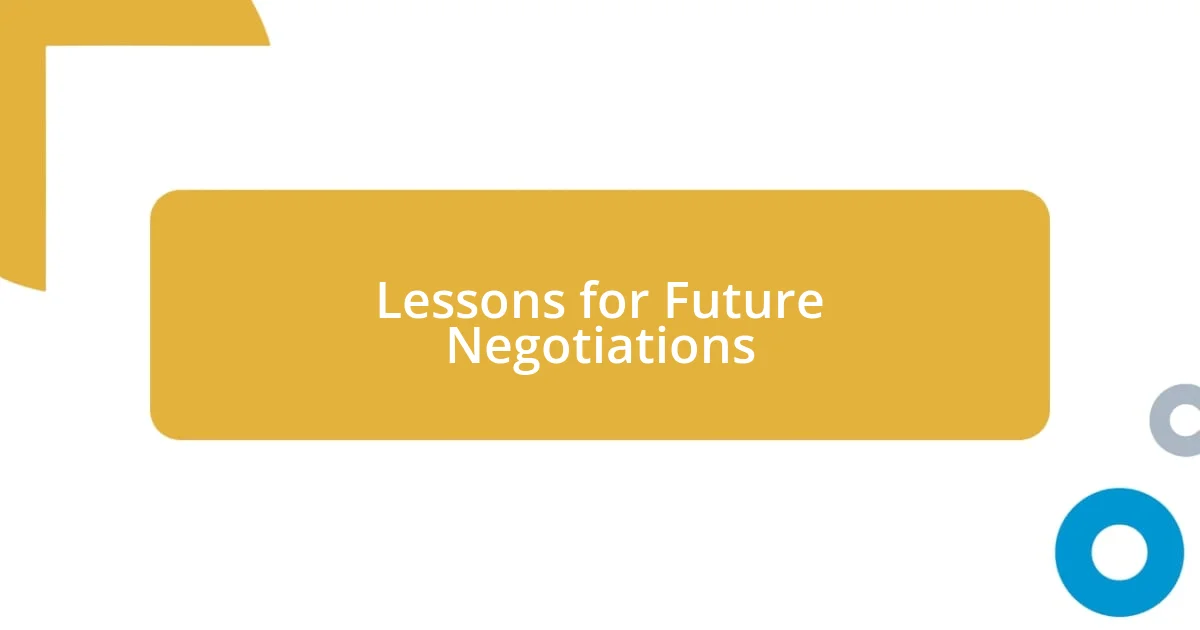
Lessons for Future Negotiations
One of the biggest lessons I’ve learned is the importance of preparation. In a recent negotiation, I walked in feeling ready yet overlooked the significance of understanding the other party’s key priorities. When I finally took the time to research their goals and pain points, it changed the dynamics of our conversation. Have you ever had an experience where knowing the other side made all the difference? I realized that being equipped with this insight not only fostered trust but also paved the way for more meaningful dialogue.
Another vital takeaway is the power of flexibility. I’ll never forget a negotiation where, despite my firm stance on certain terms, I was willing to adjust on less impactful points. This openness allowed the other party to feel more empowered and gave us room to explore creative solutions. It taught me that sometimes, letting go can lead to unexpected breakthroughs. How often do we cling to our positions, missing out on collaboration? I now understand that flexibility can turn a potentially rigid situation into a thriving partnership.
Lastly, emotional intelligence plays a critical role in negotiations. I once found myself in a discussion that became heated due to misunderstandings. I had to pause and actively listen, allowing the other party to express their frustrations without interruption. This shift in approach not only calmed the situation but also helped us clarify miscommunications that could have derailed the agreement. Isn’t it fascinating how harnessing empathy can enhance our negotiations? It’s become clear to me that listening is just as important as speaking, if not more so.


